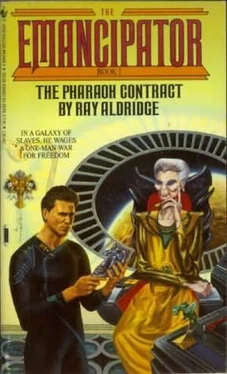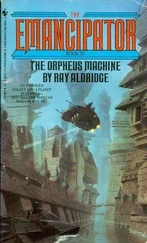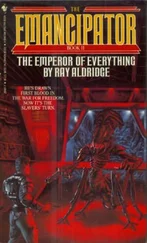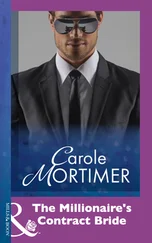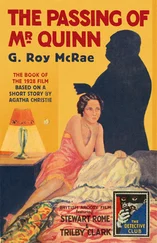* * *
With the geometries firmly established, Nacker extended his sensorium along the floor of Ruiz’s mind, spreading out through the concealing ooze of dead memory. Nacker came to surround the roots of the death net where they struck deep into Ruiz’s cerebral bedrock. No direct attack on the net was possible; any such efforts would be detected instantly, triggering the net. But indirectly there was much that could be done. A thin slippery film of passionate energy, drawn from Ruiz’s libidinous reserves — the essence of love-of-life — could be injected under the anchorage system of the death net. If the net was triggered, the cables would slip harmlessly for precious moments before they tore loose. The only drawback to this approach was that it would leave Ruiz, his brain buttered with sexual energy, somewhat vulnerable to romantic impulses. But nothing was ever gained without loss. Nacker found this an amusing — and personally satisfying — solution to Ruiz’s problem.
And besides, Nacker thought, no other solution would work as well.
He had chosen no easy technique. Each anchorage point had to be approached with exquisite caution. The actual insertion of the lubricant required a delicacy that only a half-dozen non-Gencha minddivers in all the pangalac worlds could have managed.
At last he was done.
But before he withdrew, Nacker treated himself to a recent memory, of Ruiz in his hideaway.
Nacker watched comfortably from behind Ruiz’s eyes as Ruiz went out onto his terrace, built at the edge of a great rift. Scattered about at the edges of the terrace were deep planters, in which bloomed flowers from a hundred worlds. Outside, nothing but raw rock; inside, the sweet smell of blossoms.
Ruiz filled a long-spouted watering can from a tap and began to water the beds, slowly and methodically. The fierce blue sun was moderated into a warm caressing light by the same boundary field that retained the terrace’s atmosphere. The only sound came from the bees that buzzed among the flowers, moving to and fro between the beds and the hive that stood in a shaded corner of the terrace.
Nacker sank more deeply into the memory, seeking Ruiz’s thoughts as he went about his task, but Ruiz seemed empty of thought, empty of emotion, existing only in the moment, and Nacker wondered how such a thing was possible.
Each time Ruiz came to him, Nacker found such a memory and marveled at it. So strange, that Ruiz Aw — feared enforcer for the Art League, a man who killed with a directness and detachment that was surely pathological — should spend his uncontracted time on an empty lifeless world tending flowers, all alone.
A very odd man . Nacker withdrew into himself and remembered a conversation he had once had with Ruiz, on one of the enforcer’s first visits to his hold.
“You’re a former slave yourself,” Nacker had said then, full of wry amusement. “How can you work as a slave catcher for the League?”
“There are worse masters. The League treats its property as well as is practical.”
“Do you feel no qualms of conscience?”
Ruiz had looked at him with neutral eyes. “Should I?”
“Well… perhaps. Some would.”
Ruiz made no comment for a long moment, then spoke in a patient voice. “Have you ever heard of Silverdollar, the ice world? It’s somewhat beyond the pangalac frontier, spin-ward. A mining planet.”
“No,” Nacker said.
“They have what amounts to a sapient fish there; it lives under the ice for most of the year, emerging into open water only during the equatorial thaws. Well, it’s not really a fish; it’s warm-blooded. But it has gills, so I call it a fish. Perhaps the fish aren’t really sapient, since they have no technology at all, but they have a language of their own, and they’ll tell you strange fish myths that you can almost understand. They absorb new languages with extraordinary ease. It’s not just an idiot savant ability; the fish are in high demand as translators of poetry and novels and other verbal works of art. They seem to have the ability to transcend the species barrier, to translate the intent and the specific emotional coloration of a work. No one understands how this is possible, not even the fish. Their existence has spawned several competing new schools of neurolinguistics, but no one really has any idea how they do it.”
“They must be very valuable.”
“Oh, yes. For years, the only supply came from hunters who ventured under the ice, a dangerous business because of the other predators of Silverdollar. Clones raised off Silverdollar were nonverbal, useless as translators; some unknown factor in their native environment triggers the development of the facility. The price of one of these fish was consequently very high, until entrepreneurs came to Silverdollar and built a hatchery. They enclosed a suitable area of under-ice ocean with a force field and burned open a thread of open water. The fish, thinking that the thaw had come early, congregated along the thread, where they were easily scooped up, cloned into multitudes, and released into the safety of the field. It worked well and the entrepreneurs became wealthy.”
Nacker could not find the relevance of Ruiz’s story. “And what does this have to do with your work?”
“The fish are slaves; would you agree?”
“Yes….”
Ruiz had turned away, so that Nacker could not see his face. “The hatchery is heavily fortified, protected by both planetside and orbital weapons. The security forces are Dilvermooners, numerous and well trained. No frontal assault would succeed, unless the attackers were willing to burn a hole out of the ocean — which would defeat the purpose of the exercise.”
Ruiz stopped, as though his story was finished. Nacker finally grew impatient. “And so?”
“And so.” Ruiz sighed. “What if you were willing to take a job at the hatchery? What if, some dark night, you were to creep forth with a dip net and a bucket? Which approach would yield the greater number of liberations?”
Ruiz fell silent.
Nacker thought about the story. After many minutes of silence, he said, “So, Ruiz. Have you gotten any use from your dip net yet?”
But Ruiz had lost interest in the conversation and wouldn’t answer.
* * *
Nacker drew himself back into a probe of minimum caliber and began the touchy business of rising back to the surface of Ruiz’s mind.
* * *
Ruiz heard the last of the liquefied shockgel draining away, slurping down the immo-bed’s drains. He opened his eyes. Nacker sat at his side, unmoving, as always.
“Ah, you’re with us again,” Nacker said. The synthetic voice was an exhausted whisper, for effect. Nacker could as easily have reverted to his elf voice, or any of the other vocalizer styles the minddiver favored.
Ruiz ran his fingers through his wet hair, raking off the silver halo of probe wires. “Yes… what success?”
“Enough, my friend. Though, as always, I remind you of my motto: I do good work; still, don’t get caught.”
Ruiz Aw hurried back through the Beaster Level without incident, driven by the Art League mission-imperative that filled his mind. When he emerged into the civilized corridors of Dilvermoon, he took a tubecar to the launch complex where he kept his starboat.
The Vigia was a small boat, somewhat battered on the outside, but well maintained mechanically and luxurious within. Ruiz boarded her with a sense of homecoming, and when her hatch closed behind him, he felt safe for the first time in days.
The mission-imperative accepted his boarding as an acceptable movement toward completion of the mission he had contracted to perform, and so its compulsion relented. Ruiz felt the easing of the compulsion as a pleasurable languor, and he resolved to enjoy the sensation while it lasted. Ruiz took a snifter of good brandy into the lounge, where he sprawled comfortably in his favorite chair. He breathed a long sigh, releasing tension. He took a warming sip, then set the snifter aside and closed his eyes. He thought about Nacker’s analysis of the mission — that the Art League was willing to spend him to get even a bit of information on the poachers who were working Pharaoh. Why? True, Pharaoh was a lucrative world, but the League owned a thousand as profitable. What was it about that particular world that made it so special? Or was it something else?
Читать дальше
